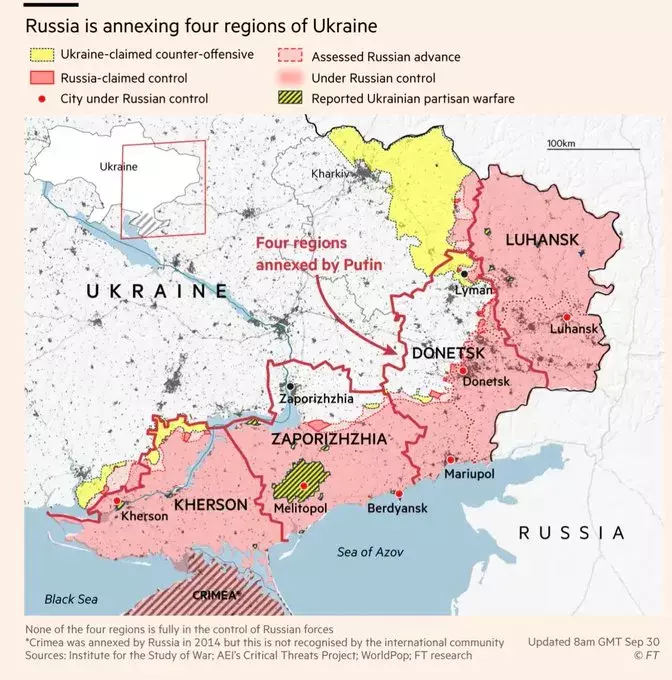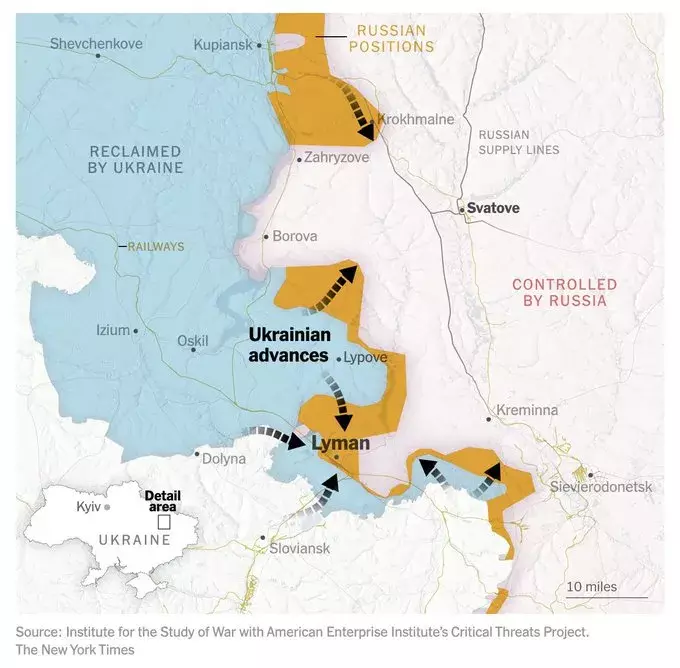Even by his own standards Vladimir Putin’s speech on 30 September in the Kremlin’s St George’s Hall was unhinged. For those who can face reading it, it can be found here. As he ranted about the west, denouncing it in lurid terms for a range of evils, from imperialism to satanism, it seemed, as Mark Galeotti observed, that he was trying to convince himself as much the outside world about this grand civilizational struggle with the West.
The rant had a purpose, which was to demonstrate the irrelevance of legality. The annexation of Luhansk, Donetsk, Zaporizhzhia and Kherson, now to join Crimea as part of the Russian Federation, goes directly against the Charter of the United Nations. Instead of this being acknowledged as a foundational document of international law, it was wrapped up in a denunciation of the West’s claims about a ‘rules-based international order’, which only reflected their selfish and malevolent interests. Russia was under no obligation to follow those rules. If it wanted to expand its borders, it was fully entitled to do so.
Ever since the Kosovo War in 1999, and NATO’s use of the principle of self-determination and reports of atrocities to justify their support of the Kosovar Albanians, he has employed this same combination of claims to rationalize his violations of the sovereignty of neighboring countries. Hence the contrived processes of sham referendums and fake claims of Ukrainian terror.
Implications for Diplomacy
Although it is always disturbing listening to these rants, the conclusion was not surprising. He explained that this was an irreversible move. This was his political offer:
‘I want the Kyiv authorities and their real masters in the West to hear me, so that everyone remembers this: people living in Luhansk and Donetsk, Kherson and Zaporizhzhia become our citizens forever. (Applause.)’
‘We call on the Kyiv regime to immediately cease fire, all hostilities, the war that it unleashed back in 2014, and return to the negotiating table. We are ready for this, it has been said more than once. But we will not discuss the choice of the people in Donetsk, Lugansk, Zaporozhye and Kherson, it has been made, Russia will not betray it. (Applause.) And today’s Kyiv authorities should treat this free will of the people with respect, and nothing else. This is the only way to peace.’
Should Kyiv do as he asked and accept the permanent transfer of these provinces, it is not clear what they would be getting in return: Putin presumably would be looking for Ukrainian neutrality and the ending of sanctions. If he was negotiating from a position of strength then these demands might have some credibility. But his position is weak. Ukraine’s only interest is total Russian withdrawal which Putin now says in constitutionally impossible.
Even those in the West most keen to push for a negotiation around the current territorial holdings should appreciate that however difficult it is to get Russia to withdraw from Ukraine, they are not going to convince Ukraine to withdraw from Ukraine. In addition, while Crimea had a separate status of all its own, because of its annexation back in 2014, it was possible to imagine how it might be dealt with in negotiations by special measures. Now it is just one of five illegally annexed provinces whose fate is tied together.
Putin has boxed himself in with these moves. Before it was possible to imagine, if always unlikely, that there could be some diplomatic means to bring the bloodshed to an end, for example by discussing forms of shared citizenship for those who wished to be attached to Russia or new forms of security arrangements.
That path has now been blocked. The Ukrainian government’s response to the speech was to insist that they could not negotiate with Russia so long as Putin remains in power. The war is now destined to carry on to its own bitter end. It also means that even should the fighting conclude it is not clear how issues such as war crimes, reparations and the unwinding of the sanctions’ regime will be handled.
Implications for Nuclear Use
Nuclear threats were not as prominent in this speech as they had been in the mobilization announcement of 21 September. There was a strong implicit reference when he spoke of Russia’s willingness to use ‘all available means’ to keep safe Russian territory, in its new expanded definition. There was also an explicit hint, when he referred to the US as ‘the only country in the world that twice used nuclear weapons, destroying the Japanese cities of Hiroshima and Nagasaki.’
He then added, ‘Incidentally, they created a precedent.’ In the years since 1945 enormous international efforts, many involving first the Soviet Union and then Russia, went into ensuring – successfully – that this precedent was not followed. But at least Putin did not follow this up with any overt nuclear threats. Conveying a sense of nuclear menace is part of his strategy, but that is not the same as identifying ways of employing these weapons to help turn the tide of this war without making everything a whole lot worse.
The nuclear issue does come into play with Zelensky’s response to Putin’s statement. He announced that he would seek to fast track the country’s accession to NATO. Holding back on that aspiration was the one big concession that Zelensky was keeping available as something that might be put on the table in a serious negotiation. But the Biden Administration quickly dismissed the idea that this could be addressed at speed. Once Ukraine joined NATO it would benefit from the alliance’s Article V and expect active engagement in Ukraine’s defense. This is exactly the development that Putin has been using his nuclear forces to seek to deter. But the application can stay on the table, a reminder to Russia that, once nuclear weapons were used in any form they would no longer be serving a deterrent purpose.
Biden’s main response, as he dismissed the legitimacy of Putin’s move, will affect the course of the war. He announced that he was pushing forward with the next $12 billion assistance package to Ukraine and imposing more sanctions on Russia and members of the elite responsible for the prosecution of this war.
The Implications of Lyman
Meanwhile as this elite gathered to listen to Putin’s speech news was coming in from eastern Ukraine of the effective encirclement of the town of Lyman, a key logistical hub for the eastern Donbas, as anticipated in my previous post. I pointed there to the tension between a political strategy that must have the Russian flag in as many places as possible and a military strategy that should conserve scarce resources, and so trade space for time, abandon vulnerable positions to establish stronger defensive lines that might be held until the newly mobilized forces can fill out the front lines. The political strategy has won. Putin’s fixation with taking and holding pieces of territory at whatever cost has made a full defeat more likely.
There were believed to be some 2,500 troops in Lyman along with a similar number already pushed out by Ukrainian forces from surrounding villages. The Russian Ministry of Defense announced that troops have been withdrawn to more ‘defensible positions.’ Many appear to have been killed and captured in the process, largely because of heavy Ukrainian artillery fire. The Russians have lost yet more equipment. There are reports from Ukrainian sources that some days ago Russian troops asked for permission to evacuate but this was denied.
Already there are recriminations with various Russian factions blaming each other and pointing to a series of complacent command decisions. The Russian position in the area is now even worse. with shortages of men and even more stretched supply lines adding to their woes. The more Ukrainian forces can move forward the more Russian assets are in artillery range. Ukrainian units are reported to be pressing Kreminna and may soon threaten the Russian positions in Lysychansk and Severodonetsk, taken in June after a long and costly (for both sides) struggle. There are also reports of a new push by Ukrainian forces in Kherson.
All this mocks Putin’s announcement, demonstrating that he can’t hold what he has just annexed. The question now is how long the Russian people and, most importantly, the members of the power elite, put up with this recklessness. Polling suggests that support for the war has fallen sharply. The latest shows that from 48% of Russians wanting the war to continue in August now only 29% are determined about pressing on. Another 15% are lukewarm and 48% want peace.
Putin offers no way to fight or negotiate a way to victory. More men may so far have fled the country than joined the army. The audience at St George’s Hall look more perplexed than inspired, watching a man who has lost his swagger, caught up in a deluded world of his own construction, but out of which he has inflicted a real-world catastrophe.
Lawrence Freedman is Emeritus Professor of War Studies King’s College London. His next book is: Command: The Politics of Military Operations from Korea to Ukraine (UK Penguin, US OUP)
Reprinted from Comment is Freed. See the original here.
The views expressed in this article are the author’s and not necessarily those of the Kyiv Post.


